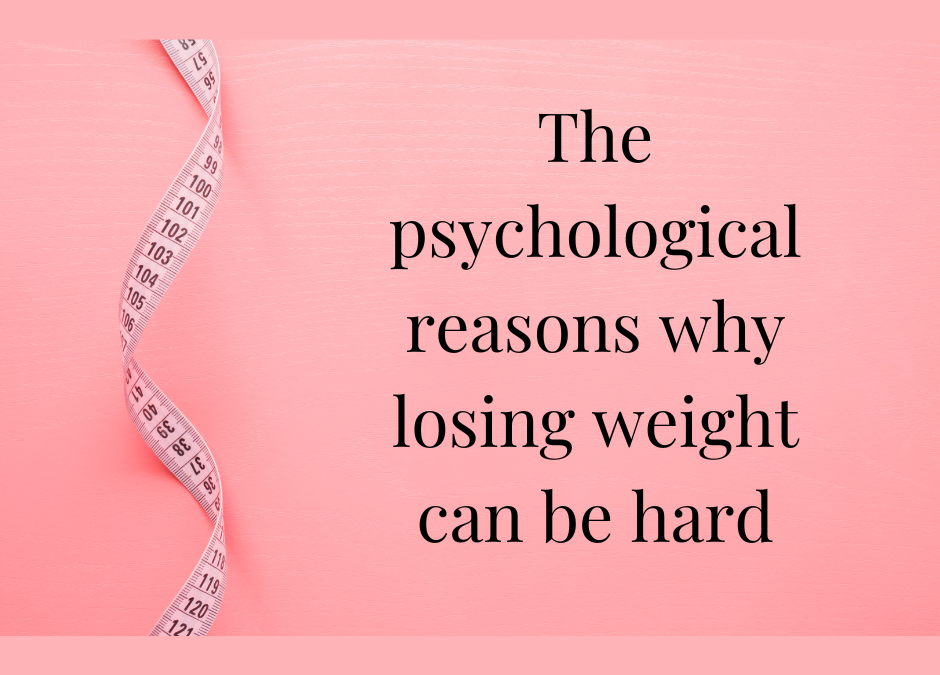Most people who struggle to lose weight are usually eating certain foods and certain amounts of it, that are preventing them from losing weight. Unless there is a biological cause, overeating or eating the “wrong” foods is usually caused by psychology i.e. the beliefs and memories in the person’s subconscious mind.
The good news is that a person’s psychology can change and as a result they can stop this behavioural pattern and lose weight.
However, the trick is to find out how the person’s psychology is leading them to behave in these ways. What I have noticed is that there are a number of common psychological blocks to weight loss.
So, before someone can change their psychology, the block to weight loss needs to be identified and then cleared.
Before we begin let’s have a quick psychology lesson……
Everyone has a subconscious mind, which contains hundreds, if not thousands of beliefs.
The subconscious mind also comes up with strategies also known as behaviours (such as overeating) to help the person to avoid pain and move towards pleasure, based on the beliefs that they have.
So, the subconscious mind creates behaviours (e.g. overeating) based on the beliefs (e.g. food gives me comfort) that a person has.
If the person changes their beliefs, the subconscious mind will find a new behaviour in line with the new beliefs. This is how behaviour change occurs. If you want to change one of your behaviours, you will need to change the beliefs that have led the subconscious to come up with this behaviour first.
So, let’s look at the types of beliefs that lead the subconscious mind to create the behaviour of overeating
Here are the 8 most common psychological causes of
overeating/emotional eating/weight loss blocks……..
There are other blocks and for someone to overeat, they could have one or more of the following blocks:
1) Protection
The subconscious will make someone larger, through overeating or stopping them from losing weight, if they have a belief that they need to be protected from someone. This can happen if they have had a very negative experience with someone. This is usually someone from their past, but sometimes it can be someone in their present. This block is usually caused by traumas, involving other people, in a person’s past.
2) Positive memories of food and the associations formed
When we are younger, we have many positive experiences where food is present, such as when we’re comforted, birthday parties, celebrations, Christmas, Easter, with one of our favourite family members etc. There is a very long list of positive occasions that involve food.
When people are in this situation, they often associate the food with the positive feelings (such as excitement, connection, comfort and feeling loved) that they experienced at the time.
They then form the belief that the food that was present can create these positive feelings again. This isn’t true because the people involved and the situation created the feelings, not the food, but this isn’t what their minds believe. These positive experiences with food teach many of us that this type of food is good for us in some way. This is an important part of emotional eating as someone who believes that foods can make you feel better are significantly more likely to eat when they feel bad.
3) Negative emotions
Many people eat when they experience negative emotions such as stress, overwhelm, anger, boredom and loneliness. They are feeling bad and their mind looks for ways (strategies/behaviours) to help them to stop feeling like this. They start to eat at this point because they believe that food will help them to feel better based on their younger experiences (see positive memories section). There are many people out there that don’t eat when they feel a negative emotion, so for someone to overeat when they are feeling a negative emotion, they must also have the belief that food can create positive feelings.
4) Negative family food experiences when younger
Our experiences within our families, when we are growing up, create food beliefs.
One common negative family food experience is when family members sometimes don’t have enough food to eat, for example due to poverty or due to having a large family (with many mouths to feed & competition for food). Those who experience this may be more likely to overeat as an adult, as their mind believes that “there isn’t enough”. To reduce the stress of this belief, it constantly looks for food.
Another common family experience that can create overeating is being punished for not eating all of our food i.e. kept at the table until we have finished all of our dinner, so that we “didn’t waste food”. Many adults still subconsciously follow this “don’t waste food” instruction that their parents gave them many years ago.
5) Food is a treat
When we were younger, many of us were rewarded with food/treats for being good or being successful. As a result, many of us now have the belief that when we do well, we’ve been good or we’ve endured something, we deserve to give ourselves a treat.
6) Negative view of being the goal weight
When someone has negative beliefs/feelings about being the weight that they want to be, they will associate the goal with pain/discomfort and the subconscious mind will create sabotaging behaviours to prevent the person from achieving the goal weight.
Some people believe that once they are the desired weight, they will experience problems e.g. they worry that some of their friends will be jealous and will not like them anymore or they worry that they will become more attractive to their partner and they worry that he will make more sexual advances, which they don’t want.
The subconscious is designed to protect someone from pain, so it won’t allow the person to achieve the goal weight, if they subconsciously believe that losing a certain amount of weight will cause them problems.
7) Feeling deprived during the weight loss journey
Many people who go on a weight loss journey have negative beliefs about the process. They believe that they will be deprived and suffer, if they can’t eat what they want anymore. They don’t stay on the weight loss journey as the mind associates it with pain, which the mind will make sure the person avoids.
8) Anger at an authority figure (past of present)
You’re probably wondering what has an authority figure got to do with weight loss, right?
Well, this is quite a surprising one, but it can be a block for some people. If someone is annoyed at an authority figure (past or present), they are usually annoyed at being told what to do and at not being in control.
When someone tells themselves that they are not allowed to eat certain foods, it feels like this is yet another order. They themselves become the authority figure. This can trigger their anger at the original authority figure and can awaken the rebel within them that is still angry. This rebellious part of them can sabotage their weight loss by telling themselves “I’ll eat what I want, when I want, no one is going to tell me what to do again”.
In that moment their need to be in control and free is more important than losing weight.
Can you relate to any of the 8 weight loss blocks? All it needs is one block to stop someone from losing weight! The good news is that these blocks can be overcome by changing the beliefs and memoires that have created the blocks.
My favourite methods for changing beliefs and memories are Emotional Freedom Technique (EFT Tapping), Matrix Reimprinting and Havening®.
Do you need help overcoming these blocks to weight loss? Email me at emma@themindmermaid.com for more info

